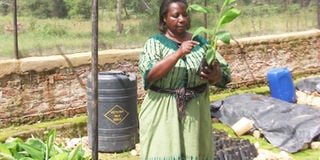Using genetic technology to produce more matooke

Florence Sanyu organising her nursery bed. PHOTO BY OTUSHABIRE TIBANGYE
What you need to know:
Otushabire Tibyangye takes us through the success story of Florence Sanyu, a retired civil servant who wants to change the face of banana planting in Mbarara district
Her intention was not to do banana but mushroom farming for herself and other women for income diversification. “As an agricultural officer for Kampala district I wanted to help women farmers make their own mushroom seeds because we found it expensive to keep on buying mycelium every time farmers wanted to plant,” says Florance Sanyu.
This took her to Mr Erastus Nsubuga’s home in Buloba, 12 miles on Mityana road in search for an old autoclave. On reaching there, Sanyu developed other ideas and the search for the autoclave became history since it was too expensive for their project.
She found Nsubuga practicing agro genetic technologies (AGT). He was involved in producing genetically modified plantlets of bananas. Having failed to acquire an autoclave, she went back determined to start a nursery for banana plantlets. She saw it as an opportunity for the people of Ankole region who are some of the biggest producers of matooke in the country, to get good seeds.
About two years ago, the need to start a project that would keep her busy after retiring inspired Sanyu to embark on this venture since she the responsibility of looking after children had reduced. She struck a deal with Nsubuga and a nursery worth Shs6m was opened up in Bugarama Sayuni village, Rwanyamahembe Sub County in Kashaari Mbarara District in September last year.
Her project, Trinity organic Projects Initiative has so far produced 20,000 banana plantlets which she has sold to farmers. She has also set up a demonstration garden.
Why the new technology?
Sanyu says the benefits of the new technology are that:
•It gives a farmer the opportunity to grow clean seeds that are free from the usual banana diseases like nematodes.
“The farmers need to appreciate the benefits of the technology when you compare the cleanliness of the seeds, availability and transportation involved to the traditional availability of the local varieties. This enables farmers to have uniform types of plants as we are breeding one type at a time,” she says.
•It controls the transmission of banana diseases from farmer to farmer as this is a one stop center. This could act as a control measure to curb banana wilt disease that has hit the country and Ankole in particular.
• Farmers will be able to produce the same variety of bananas at the same time which could satisfy the export market.
The technology is not producing genetically modified matooke. The varieties are of the local nature. Some of them currently in the nursery are Mporogoma, Kibuzi, Entaragaza, Enyeru, Lwadungu and Musakara.
Constraints
Marketing is still a big problem as the local farmers are yet to be sensitised about the advantages of clean planting materials.
“I have tried to sensitise farmers on radio talk shows and also held workshops with district agricultural officials from the Ankole region but the response is still wanting,” she says.
She is also set back by roaming goats from neighbours. They attack and eat plantlets in the demonstration garden.
Sanyu is challenged by lack of running water to her nursery during the dry season. There is also lack of enough manual labour during the insertion of the plantlets into the polythene bags.
Pricing is also prohibitive to an average farmer. A plantlet goes for Shs1,000 to Shs2,500. Not many farmers can afford to pay this price when they can get the local ones at about Shs500.
However Mbarara District Naads coordinator Benon Musiime says that since it is the beginning of the project, the district is willing to encourage and support her in her endeavours.
“We are going to support her through encouraging farmers to plant clean planting materials. As we speak, the district has already bought from her about 4,000 plantlets and distributed it to farmers in eight sub counties in Mbarara District and we are yet to buy more from her.”
He also wants her to venture into the production of bogoya and apple bananas (ndizi) which are threatened also by banana wilt disease.
He is optimistic about the region being able to produce enough matooke for home consumption, local and export market if the local farmers embrace this technology. The target market for export includes, Southern Sudan, Kenya, Rwanda, Burundi and Eastern Congo.
Her future plan is to see that most banana farmers embrace clean planting materials for better results and diversify into fruit growing.




